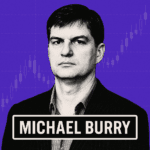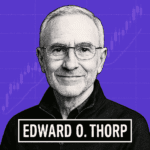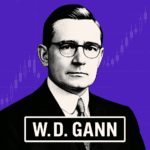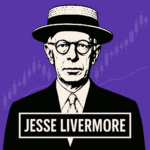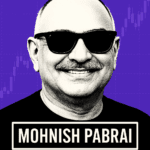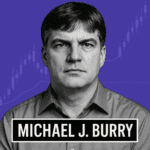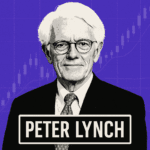BENJAMIN GRAHAM
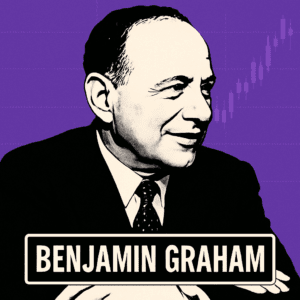
Key Takeaways from Benjamin Graham's Life and Career
Key Takeaways
- Pioneering Value Investing: Known as the “father of value investing,” Graham co-authored Security Analysis (1934) and wrote The Intelligent Investor (1949), foundational texts for modern investing.
- Innovative Investment Principles: Developed concepts like the “margin of safety” and “Mr. Market,” emphasizing rational decision-making, long-term focus, and the distinction between investment and speculation.
- Mentorship Legacy: Mentored notable investors, including Warren Buffett, who credits Graham as a significant influence on his life and career.
- Academic Contributions: Taught at Columbia Business School and UCLA, shaping the field of security analysis.
- Lasting Impact: Advocated shareholder rights, dividend payments, and financial transparency, influencing generations of investors and financial theory.
Who is Benjamin Graham ?

Early Life & Education (1894–1914)
- 1894: Born Benjamin Grossbaum on May 9 in London, England, to Jewish parents. His family moved to New York City when he was one year old and changed their surname to Graham to assimilate into American society.
- 1907: The Panic of 1907 and his father’s death left the family in poverty, influencing Graham’s pursuit of financial security.
- 1914: Graduates as salutatorian from Columbia University at age 20, excelling in multiple disciplines (mathematics, English, and philosophy). Declines teaching offers to pursue a career on Wall Street to support his widowed mother.
Wall Street Career & Innovations (1914–1936)
- 1914: Begins working on Wall Street and gains a reputation for analytical rigor.
- 1920s: Gains attention for uncovering hidden value in companies, such as the Northern Pipeline case, an early instance of shareholder activism.
- 1936: Co-founds the Graham-Newman Corp., a mutual fund that exemplifies his value investing principles. His largest success was an early investment in GEICO, which became highly profitable.
Foundational Investment Works (1934–1949)
- 1934: Co-authors Security Analysis with David Dodd, introducing the concepts of intrinsic value and “margin of safety,” distinguishing investment from speculation.
- 1949: Publishes The Intelligent Investor, considered one of the greatest investment books of all time. The book emphasizes rational decision-making, long-term focus, and avoiding emotional reactions to market fluctuations.
Academic Contributions & Mentorship (1928–1976)
- 1928: Begins teaching at Columbia Business School, where he mentors students, including Warren Buffett, who described The Intelligent Investor as “the best book about investing ever written.”
- 1940s–1950s: Expands his teaching to UCLA Anderson School of Management, influencing a generation of investors.
- 1956: Retires from active investing after dissolving Graham-Newman Corp. but continues teaching and writing.
- Mentorship: His students and followers include Warren Buffett, Irving Kahn, Charles Brandes, and Seth Klarman, all of whom built successful careers inspired by his principles.
Philosophical & Economic Contributions
- Investment Philosophy: Advocated rational, systematic investing, emphasizing:
- “Margin of Safety”: Buying securities below their intrinsic value to reduce risk.
- “Mr. Market”: A metaphor for market irrationality, encouraging investors to focus on fundamentals over daily price fluctuations.
- Investment vs. Speculation: Defined investment as operations ensuring safety of principal and satisfactory return.
- Economic Theory: Proposed an alternative to the gold standard and developed ideas on global currency, gaining renewed attention during financial crises.
Later Years & Legacy (1956–1976)
- 1956: Retires from active investment management but remains influential through teaching and writing.
- 1976: Passes away on September 21 in Aix-en-Provence, France, at age 82.
- Legacy: Considered the founder of value investing, Graham’s principles remain central to investment education and practice. His books, Security Analysis and The Intelligent Investor, are essential reading for finance professionals.
Personal Life
- Married three times and had four children.
- A polymath, Graham learned multiple languages, wrote a Broadway play, and invented calculators, showcasing his intellectual curiosity beyond finance.
Lasting Impact
- Graham’s theories underpin modern investment strategies, including mutual funds, index funds, and hedge funds.
- His disciples have extended his principles, blending them with modern approaches to adapt to evolving markets.
- Graham’s advocacy for shareholder rights and financial transparency continues to influence corporate governance and investment ethics.
Who is Mr. Market ?
Mr. Market is a fictional character Graham created to personify the stock market. Think of him as a business partner who shows up every day offering to buy your shares or sell you his. However, Mr. Market is not a rational actor; his mood swings wildly from euphoria to despair, often without any logical reason. On some days, he’s optimistic, offering to buy your shares at exuberantly high prices. On other days, he’s pessimistic, offering to sell you his shares at a steep discount because he’s overcome with fear.
The brilliance of this metaphor lies in its simplicity: Mr. Market doesn’t dictate your actions. You can choose to ignore him entirely if his offers don’t make sense to you. Your job as an investor is to remain calm and rational, taking advantage of Mr. Market’s emotional swings rather than being influenced by them.
Key Lessons from Mr. Market
1. The Market Is a Servant, Not a Master
Graham’s primary lesson is that the market’s price movements should serve you, not control you. As an investor, you are free to accept or reject Mr. Market’s offers. If the price of a stock doesn’t align with its intrinsic value, there’s no need to act. Your goal is to make decisions based on careful analysis, not emotional reactions to market fluctuations.
2. Focus on Intrinsic Value
The concept of intrinsic value is central to Graham’s philosophy. Intrinsic value refers to the true worth of a business, calculated based on its fundamentals such as earnings, dividends, assets, and growth prospects. Mr. Market’s mood swings often create a disconnect between a stock’s market price and its intrinsic value. Savvy investors capitalize on this discrepancy by buying undervalued stocks and selling overvalued ones.
3. Emotions Are Your Enemy
Mr. Market’s erratic behavior serves as a reminder that emotions like fear and greed can lead to poor investment decisions. Graham advises investors to maintain a disciplined and unemotional approach, avoiding the herd mentality that often drives market bubbles and crashes.
4. Patience Pays Off
Mr. Market is unpredictable in the short term, but over the long term, stock prices tend to converge with their intrinsic values. This means that patient investors who resist the urge to act on every market movement are more likely to achieve favorable outcomes.
How to Apply the Mr. Market Philosophy
1. Develop a Margin of Safety
Graham’s “margin of safety” principle complements the Mr. Market metaphor. By investing in stocks priced significantly below their intrinsic value, you create a buffer against errors in judgment or unexpected market downturns. When Mr. Market offers shares at a discount, you can act with confidence, knowing you’ve built in a margin of safety.
2. Adopt a Long-Term Perspective
Trying to predict or time Mr. Market’s behavior is a losing game. Instead, focus on the long-term potential of the businesses you invest in. Over time, as companies generate earnings and grow their intrinsic value, their stock prices will reflect their true worth.
3. Keep Emotions in Check
Recognizing Mr. Market’s irrational tendencies can help you detach emotionally from short-term market fluctuations. Whether prices soar to unsustainable heights or plummet to irrational lows, remind yourself that these are opportunities, not threats.
4. Do Your Own Homework
Don’t rely solely on market prices or popular sentiment to make investment decisions. Conduct thorough research and analysis to determine the intrinsic value of a stock. This independent thinking is what allows you to take advantage of Mr. Market’s mispricing.
Modern-Day Relevance of Mr. Market
While Graham introduced Mr. Market in the mid-20th century, the concept remains strikingly relevant in today’s investment landscape. In the age of 24/7 financial news, social media, and algorithmic trading, market sentiment can swing wildly in response to headlines, tweets, or economic data. The result is the same irrational behavior that Graham described decades ago, presenting opportunities for disciplined investors.
For example, during market sell-offs triggered by short-term fears, many high-quality stocks become undervalued. Similarly, during periods of excessive optimism, stocks can become overpriced. Investors who adopt Graham’s philosophy and view these fluctuations through the lens of Mr. Market can make rational, data-driven decisions rather than succumbing to panic or euphoria.
Conclusion
Benjamin Graham’s Mr. Market metaphor is a timeless tool for understanding the irrational nature of the stock market. By treating the market as a servant rather than a master, focusing on intrinsic value, and keeping emotions in check, investors can turn market volatility into an advantage. In a world where market sentiment often seems louder than reason, Graham’s wisdom serves as a calming, rational guide for navigating the noise and achieving long-term success.
So the next time Mr. Market comes knocking, remember: you hold the power to decide. Embrace his irrationality, and use it to your benefit.

Benjamin Graham's Investing Principles
The intelligent investor is a realist who sells to optimists and buys from pessimists.
Successful investing is about managing risk, not avoiding it.
The essence of investment management is the management of risks, not the management of returns
In the short run, the market is a voting machine, but in the long run it is a weighing machine
… But to be an intelligent investor, you must take responsibility for ensuring that you never lose most or all of your money
The investor’s chief problem – and even his worst enemy – is likely to be himself
At heart, “uncertainty” and “investing” are synonyms
Individuals who cannot master their emotions are ill-suited to profit from the investment process
You must never delude yourself into thinking that you’re investing when you’re speculating
Before you invest, you must ensure that you have realistically assessed your probability of being right and how you will react to the consequences of being wrong
The intelligent investor is likely to need considerable will power to keep from following the crowd.
The margin of safety is always dependent on the price paid. It will be large at one price, small at some higher price, nonexistent at some still higher price
By developing your discipline and courage, you can refuse to let other people’s mood swings govern your financial destiny
Buy not on optimism, but on arithmetic
In security analysis the prime stress is laid upon protection against untoward events.
In the world of securities, courage becomes the supreme virtue after adequate knowledge and a tested judgment are at hand.
While enthusiasm may be necessary for great accomplishments elsewhere, on Wall Street it almost invariably leads to disaster.
Never mingle your speculative and investment operations in the same account nor in any part of your thinking
An intelligent investor gets satisfaction from the thought that his operations are exactly opposite to those of the crowd
The investor who permits himself to be stampeded or unduly worried by unjustified market declines in his holdings is perversely transforming his basic advantage into a basic disadvantage.
"Security Analysis (1934)" by Benjamin Graham and David Dodd

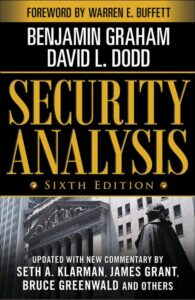
First published in 1934 during the aftermath of the Great Depression, Benjamin Graham’s Security Analysis is often referred to as the bible of value investing. Co-authored with David Dodd, the book laid the foundation for modern financial analysis and remains an indispensable resource for investors seeking to understand the principles of sound investing. Graham’s emphasis on disciplined analysis, intrinsic value, and a margin of safety has influenced generations of investors, including Warren Buffett.
The Birth of Value Investing 📊
At the heart of Security Analysis is the concept of value investing—the practice of identifying securities that are undervalued compared to their intrinsic worth. Graham argues that investors should focus on the underlying value of a company’s assets and earnings, rather than being swayed by market sentiment or speculation.
Graham’s value investing principles are rooted in the idea that markets are not always rational. While stock prices may fluctuate wildly due to emotions or external factors, the intrinsic value of a company remains relatively stable. This discrepancy between price and value creates opportunities for investors who are willing to dig deeper and conduct thorough research.
The Margin of Safety 🛡️
One of the most enduring concepts introduced in Security Analysis is the “margin of safety.” Graham stresses the importance of buying securities at a significant discount to their intrinsic value. This buffer provides protection against errors in analysis, market downturns, or unforeseen risks.
For Graham, the margin of safety is the cornerstone of prudent investing. He believed that no investment is without risk, but a sufficient margin of safety minimizes the likelihood of permanent loss. This principle remains a key tenet for value investors and serves as a guiding light in volatile markets.
Intrinsic Value: The Core of Investment Analysis 💡
Graham emphasizes the importance of calculating a security’s intrinsic value—the true worth of a company based on its fundamentals. Intrinsic value is determined by analyzing a company’s assets, earnings, dividends, and financial health. By comparing this value to the current market price, investors can identify undervalued opportunities.
In Security Analysis, Graham provides a comprehensive framework for evaluating intrinsic value. He outlines methods for analyzing balance sheets, income statements, and cash flow statements, helping investors build a clear picture of a company’s financial strength and earning power.
The Distinction Between Investment and Speculation 🎲💵
A key theme in Security Analysis is the distinction between investment and speculation. Graham defines investment as the act of thoroughly analyzing a security to ensure safety of principal and an adequate return. Speculation, on the other hand, involves betting on market movements without regard to intrinsic value or risk.
Graham cautions against speculation, noting that it often leads to significant losses. He encourages investors to approach the stock market with discipline and a long-term perspective, treating stocks as ownership stakes in real businesses rather than mere trading instruments.
Fixed-Income Securities and Equity Analysis 🔗📑
Security Analysis is not limited to equities. Graham and Dodd devote significant attention to fixed-income securities, such as bonds and preferred stocks. They provide detailed guidance on evaluating credit quality, interest coverage, and the reliability of income streams. For investors seeking stable returns, Graham’s analysis of fixed-income securities remains a valuable resource.
In his equity analysis, Graham advocates for evaluating a company’s earning power, competitive position, and management quality. He emphasizes that qualitative factors, while important, should be supported by quantitative evidence to ensure an objective assessment of a company’s value.
The Role of Market Psychology 🤔📉📈
Graham acknowledges the influence of market psychology on stock prices, coining the famous metaphor of “Mr. Market.” He describes Mr. Market as a manic-depressive partner who offers to buy or sell shares at wildly fluctuating prices. Graham advises investors to view market fluctuations as opportunities rather than threats. By remaining rational and disciplined, investors can capitalize on Mr. Market’s irrational behavior.
This focus on market psychology underscores the importance of emotional discipline in investing. Graham’s advice to “be greedy when others are fearful and fearful when others are greedy” has become a timeless mantra for value investors.
Security Analysis in Modern Times 📘
While some aspects of Security Analysis may seem dated, its core principles remain highly relevant. Concepts like intrinsic value, margin of safety, and the distinction between investment and speculation are as applicable today as they were in 1934. Advances in technology have made financial data more accessible, but Graham’s emphasis on rigorous analysis and thoughtful decision-making continues to resonate.
Modern value investors often build upon Graham’s principles, integrating them with new tools and techniques. However, the essence of Graham’s approach—focusing on fundamentals and maintaining a disciplined, long-term perspective—remains unchanged.
The Bottom Line ➡️
Security Analysis is more than just a book; it is a foundational text that has shaped the way investors approach the stock market. Benjamin Graham’s insights into value investing, intrinsic value, and market behavior provide a roadmap for navigating the complexities of investing. By adhering to principles like the margin of safety and rigorous analysis, investors can build a portfolio that withstands market volatility and delivers sustainable returns.
For anyone serious about investing, Security Analysis is a must-read. It offers a timeless framework for understanding the relationship between price and value, enabling investors to make informed decisions and achieve long-term success.
" The Intelligent Investor (1949) " by Benjamin Graham
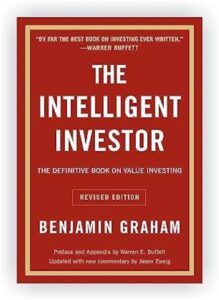
Benjamin Graham’s The Intelligent Investor, first published in 1949, is widely regarded as one of the most important investment books ever written. Described by Warren Buffett as “the best book on investing ever written,” it provides timeless principles for achieving success in the stock market. Graham’s teachings focus on value investing, emotional discipline, and a long-term perspective, making the book a must-read for both novice and experienced investors.
The Principles of Value Investing 📊
At the heart of The Intelligent Investor is the philosophy of value investing—the practice of buying securities that are undervalued by the market. Graham argues that the intrinsic value of a company is determined by its earnings, assets, and growth potential, and that successful investors focus on identifying opportunities where the market price is significantly below this intrinsic value.
Graham’s approach emphasizes a disciplined, research-driven process. He believes that by conducting thorough analysis and focusing on the fundamentals, investors can avoid speculative behaviors and achieve consistent, long-term returns. This disciplined approach remains the cornerstone of value investing.
The Margin of Safety 🛡️
One of the most famous concepts from The Intelligent Investor is the “margin of safety.” This principle advises investors to buy securities at prices significantly below their intrinsic value, providing a buffer against potential errors in analysis or unforeseen market fluctuations.
The margin of safety is a risk management tool that minimizes the likelihood of permanent losses. Graham emphasizes that no investment is without risk, but a sufficient margin of safety allows investors to navigate uncertainties with confidence. This concept has become a foundational principle for value investors around the world.
The Intelligent Investor vs. the Speculator 🎲💰
Graham draws a clear distinction between investing and speculating. According to him, investing involves careful analysis, a focus on intrinsic value, and the expectation of adequate returns. Speculation, on the other hand, is characterized by high risk and reliance on market trends or emotions.
Graham cautions readers to avoid speculative behaviors, as they often lead to poor outcomes. Instead, he advocates for a rational and disciplined approach to investing, where decisions are based on facts and fundamentals rather than market sentiment. His advice to “be an investor, not a speculator” is as relevant today as it was in 1949.
Mr. Market: A Lesson in Emotional Discipline 🤔📉📈
One of the most memorable concepts introduced in The Intelligent Investor is the allegory of “Mr. Market.” Graham describes Mr. Market as a hypothetical business partner who offers to buy or sell shares at varying prices every day. Sometimes, Mr. Market is overly optimistic, offering high prices, and other times he is pessimistic, offering low prices.
Graham advises investors to view Mr. Market’s fluctuations as opportunities rather than threats. He encourages investors to buy when prices are low and to sell when they are high, all while ignoring the emotional whims of the market. This allegory highlights the importance of emotional discipline and rational decision-making in investing.
The Defensive vs. Enterprising Investor 🛡️⚡
Graham introduces two types of investors in The Intelligent Investor: the defensive investor and the enterprising investor.
· The Defensive Investor seeks a safe and steady approach, focusing on preserving capital and minimizing risk. This type of investor prioritizes diversification and invests primarily in high-quality, income-generating securities.
· The Enterprising Investor is willing to take on more risk in pursuit of higher returns. This type of investor actively researches and selects undervalued stocks, often taking advantage of market inefficiencies.
Graham emphasizes that both approaches can lead to success, provided that the investor adheres to their chosen strategy and maintains discipline.
The Role of Bonds in a Balanced Portfolio 🔗📑
Graham highlights the importance of including bonds in an investment portfolio to provide stability and income. He advises defensive investors to maintain a balanced allocation between stocks and bonds, adjusting the proportions based on market conditions and personal risk tolerance. Bonds, with their fixed income and lower volatility, serve as a counterbalance to the inherent risks of equities.
For enterprising investors, Graham suggests that bonds can be an essential part of a diversified portfolio, especially during periods of market uncertainty. His emphasis on diversification underscores the importance of managing risk in any investment strategy.
The Power of Patience and Long-Term Thinking 🕰️📈
Graham’s philosophy revolves around the idea that successful investing requires patience and a long-term perspective. He warns against the dangers of short-term thinking and market timing, advocating instead for a steady, disciplined approach to building wealth over time.
Graham’s advice to focus on the fundamentals and ignore market noise has stood the test of time. By maintaining a long-term outlook, investors can benefit from the power of compounding and weather the inevitable ups and downs of the market.
Security Analysis and Common Stocks 📘📊
In addition to discussing general investment principles, Graham provides detailed guidance on analyzing individual securities. He outlines criteria for evaluating common stocks, including earnings stability, dividend history, and financial strength. By focusing on these factors, investors can identify companies with strong fundamentals and avoid speculative traps.
Graham also emphasizes the importance of diversification and recommends holding a portfolio of high-quality stocks to mitigate risks. His analytical framework provides a clear roadmap for evaluating investment opportunities.
The Bottom Line ➡️
The Intelligent Investor remains a timeless guide for anyone seeking to achieve financial success through disciplined investing. Benjamin Graham’s emphasis on value investing, emotional discipline, and a margin of safety provides a solid foundation for navigating the complexities of the stock market. His teachings continue to inspire generations of investors and serve as a blueprint for long-term success.
Whether you are a defensive investor seeking steady returns or an enterprising investor looking for undervalued opportunities, The Intelligent Investor offers invaluable insights to help you reach your financial goals. Graham’s timeless wisdom is a reminder that sound investing is not about following the crowd but about making rational, informed decisions.
10 Best Quotes from The Intelligent Investor 📝
1. “The individual investor should act consistently as an investor and not as a speculator.”
2. “Investment is most intelligent when it is most businesslike.”
3. “The margin of safety is the secret of sound investment.”
4. “In the short run, the market is a voting machine, but in the long run, it is a weighing machine.”
5. “The intelligent investor is a realist who sells to optimists and buys from pessimists.”
6. “The essence of investment management is the management of risks, not the management of returns.”
7. “Successful investing is about managing risk, not avoiding it.”
8. “Stock market fluctuations should be viewed as opportunities to buy underpriced securities and sell overpriced ones.”
9. “Patience is the key to long-term investment success.”
10. “The best way to measure your investing success is not by whether you’re beating the market but by whether you’ve put in place a financial plan and a behavioral discipline that are likely to get you where you want to go.”
